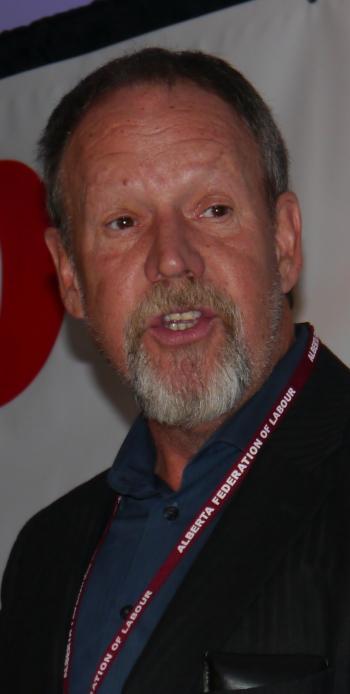Here’s my advice to members of Wildrose 2.0, the Alberta NDP and the other opposition parties with and without seats in the Legislature: Don’t start measuring the drapes in the ministers’ offices just yet.
Yes, there have now been two polls suggesting much the same thing — that the Wildrose Party is surging back after a few bad weeks, the NDP is extremely strong in the Edmonton area, and support for the Progressive Conservative government is fading.
But neither one is a particularly good poll, technically speaking. One’s based on demon dialler technology. The other used a self-selecting panel. Both were in the field over a weekend. Just the same, this is not to say that they haven’t hit on a real phenomenon, voter-intention-wise.
The first, done by a little known Toronto company called Mainstreet Technologies, said the Progressive Conservative government under Premier Jim Prentice and the Wildrose Party under just-chosen leader Brian Jean are tied at 24-per-cent each, and that Rachel Notley’s NDP has province-wide support of 15 per cent, but is at about 35 per cent in the Edmonton area.
That pollster’s demon-diallers were calling Albertans seeking push-button answers on Sunday, and the results were published Tuesday. They set opposition hearts a-pumping.
The second, conducted last Friday through Monday and published yesterday by Insights West (although why anyone would publish a poll on April 1 is not clear to me) put the tallies at 31 per cent for the PCs and 27 per cent for the Wildrose Party. It placed NDP support at 22 per cent province-wide and 31 per cent in Edmonton.
This, according to the Calgary Herald, “confirmed” the Mainstreet poll — it didn’t, but it certainly suggests a trend.
Now, my guess is that the Prentice PCs are in fact trending down at the moment and that the Wildrose and the NDP are enjoying a modest rise in support, but not at the levels claimed by these two surveys.
Not to be negative, but doesn’t anyone remember what happened right after after the last time a bunch of polls suggested a Wildrose election victory was in the offing?
To reprise: back in the now-apparently-forgotten spring of 2012 leading up to the Alberta general election of April 23 that year, polls kept saying the Tories under Alison Redford were doomed, and the Wildrose Party led by sparkling young leader Danielle Smith was cantering toward an easy majority government.
If you want to look it up, excellent search terms in addition to Smith and Wildrose would be would be “upstart party” and “surging in the polls.”
Mainstream media, which consistently pulls for the right (wing) team, could barely keep itself from hyperventilating at the thought of a government even farther to the right that the Klein-Stelmach-Redford PCs.
Then something happened. Sure, there was that Lake of Fire moment, when a Wildrose candidate unintentionally revealed where he thought his gay fellow citizens would end up in the next world. Or rather, when the PCs revealed a blog post the candidate had left conveniently lying around for them on his church’s website. But there was much more to it than that.
Some observers also believe the voters — responding to a well-run campaign by Redford’s PCs — changed their collective mind in the last hours of the campaign. That’s part of the story too.
If you want to Google what happened then, search terms like “baffled,” “breathtaking,” “unprecedented,” “clearly something’s wrong,” “I’m concerned about the impact on the credibility of the (polling) profession,” and “how did the pollsters get it so wrong?” Indeed, all these search terms happen to come out of the same story!
In other words, when you get right down to it, whatever all the other reasons may be, the pollsters just got it spectacularly wrong. Some of them more spectacularly than others.
On April 23, Redford’s PCs won a respectable majority — which under the circumstances amounted to a massive victory.
The same thing happened again, with similarly unexpected results, in British Columbia in May 2013, as it had almost happened in Quebec in September 2012.
As in Alberta, in both those elections sitting governments that appeared headed to defeat were unexpectedly reelected despite the confident predictions of the pollsters, who seem to have done a little better in a couple of elections since.
How did Redford do it in 2012? What “is so easy to miss in the province-wide and nation-wide polling — but especially at the provincial level — is the strength of incumbency,” observed Harris-Decima pollster Allan Gregg the day after the Alberta election.
A year later, right after the B.C. election, he blamed a “confluence” of factors — as the Canadian Press summarized his point, “unreliable methods used to contact survey respondents, inexperienced, fly-by-night pollsters and badly-framed questions.”
Indeed, Gregg observed then, again as summarized by CP, “a lot of inexperienced pollsters have jumped into the field, particularly in provincial campaigns, offering their surveys to the media for free as a way to promote their fledgling companies.”
Anyway, he said back in the wake of the last Alberta general election, “these people” (he meant the voters) “could be very, very mad at the government but still love ol’ Jim.”
That was a somewhat mysterious comment, presumably a generic observation about local Tory candidates as there was no major figure in the race named Jim.
Well, there is now.
Meanwhile, in other polling news, a different survey by Insights West taken in roughly the same time period concluded that more than a quarter of Albertans believe climate change is a hoax and nearly half of them believe in UFOs.
Nearly 40 per cent of them believe Princess Diana was assassinated. Surprisingly, though, only 10 per cent thought the moon landings were a hoax. Still, if we had proportional representation, that would be enough to elect MLAs to the Legislature.
Astonishingly, just 1 per cent believed Elvis is alive.
This post also appears on David Climenhaga’s blog, AlbertaPolitics.ca.



